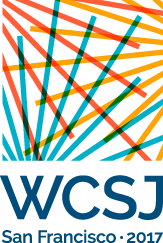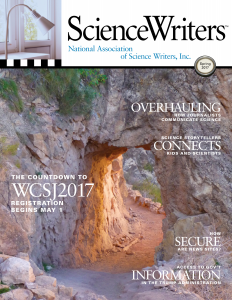The five-day program features global issues, research topics and challenges, a chance to learn how science writing is done around the world, and a star-studded cast of headline speakers together with all the classic elements of a ScienceWriters meeting: professional development workshops, networking events, field trips, a pitch slam, and Lunch with a Scientist.
With the extended length and content of the meeting, registration costs will be more than the annual workshops, but with sufficient fundraising the goal is to keep the price under $350; which is almost half the typical fee for a world conference. Register early if you are interested in specific field trips or events.
Essential content for essential journalism
A total of 49 breakout and 10 plenary sessions expressing the conference theme Bridging Science and Societies have been selected by the WCSJ2017 program committee and science committee and the Association of Health Care Journalists (AHCJ), producers of a journalism track for the conference. Organizers and speakers drawn from around the world will deliver sessions on a wide range of topics including global crisis reporting, the impact of automation, the reproducibility crisis, "moonshot" science, refugee health, cosmology, the microbiome, conflicts of interest, and fact-checking. The sessions were chosen from more than 400 submitted proposals.
Program themes include
- Ethical issues in science and science journalism
- Science storytelling: New modes, timeless techniques
- Climate, environment, and sustainability
- The science-innovation frontier
- Science reporting skills for the 21st century
- Special focus: Latin America and the Caribbean
- Global health journalism
- New Horizons in Science
- Jeffrey Bluestone, UCSF; president/CEO of the Parker Institute for Cancer Immunotherapy
- Alberto Cairo, University of Miami, Knight Chair in Visual Journalism
- Jennifer Doudna, UC Berkeley biologist/CRISPR researcher
- Susan Desmond-Hellmann, CEO of the Bill & Melinda Gates Foundation
- Mary Roach, bestselling author of Stiff and Packing for Mars
- Ed Yong, writer for the Atlantic and author of I Contain Multitudes
- Thierry Zomahoun, president/CEO of African Institute for Mathematical Sciences
The program will also include a plenary session on science journalism, authoritarian regimes, and pseudoscience.
Pre-conference activities
The Hastings Center, a bioethics research institute in New York, will organize a pre-conference symposium on New genetic technologies: Ethical debates and global science policy. Other pre-conference activities include training for student journalists, a full-day workshop for Latin American and Caribbean journalists, and workshops on emerging infectious diseases and food security.
Post-conference activities
Northern California Science Writers Association (NCSWA) is organizing post-conference field trips to the Monterey Bay Aquarium and Monterey Bay Aquarium Research Institute (MBARI), the UC Davis enology field station in Napa Valley's wine region, a seismology walk along the Hayward Fault, a U.S. Geological Survey trip to coastal slide hazard areas, a visit to X (Google's "moonshot factory"), and an interactive immersion in drug development at Bayer.
Fundraising
To date, more than $1.3 million in commitments have been secured toward the $2 million in sponsor and partner funding needed to support travel, program delivery, networking, and infrastructure for the conference. The Hastings Center, Research Councils UK, Canada's International Development Research Center, and AHCJ are among several sponsors and partners who have recently joined to support WCSJ2017. Others include the Alfred P. Sloan Foundation, Bayer, The Brinson Foundation, Johns Hopkins Medicine, Argentina's Grupo Insud, and Nature. Johnson & Johnson Innovation is the conference's Diamond Sponsor and lead underwriter.
Thanks to the generosity of NASW members and an anonymous donor's matching gift, $38,000 has been raised to support the David Perlman Travel Fellowship Fund to provide travel fellowships for international science writers.
Travel fellowships
When the deadline for fellowships closed in mid-March, applications had been received from 103 countries. A pair of fellowship committees, chaired by Robin Lloyd and Rob Irion, set to work reviewing 589 general applications and 169 student applications, respectively. More than 90 travel fellowships, including those for U.S. professional and student writers, are expected to be awarded.
Visa guidelines
Conference organizers are monitoring developments in U.S. immigration policy and assessing how new regulations and legal action might affect travel to the meeting.
We are resolute in our determination that the conference will continue its tradition of welcoming colleagues from across the globe, and we oppose any restrictions that would prevent participants from attending WCSJ2017. As October approaches, we will do everything we can to make the meeting accessible to all.
(NASW members can read the rest of the Spring 2017 ScienceWriters by logging into the members area.) Free sample issue. How to join NASW.





